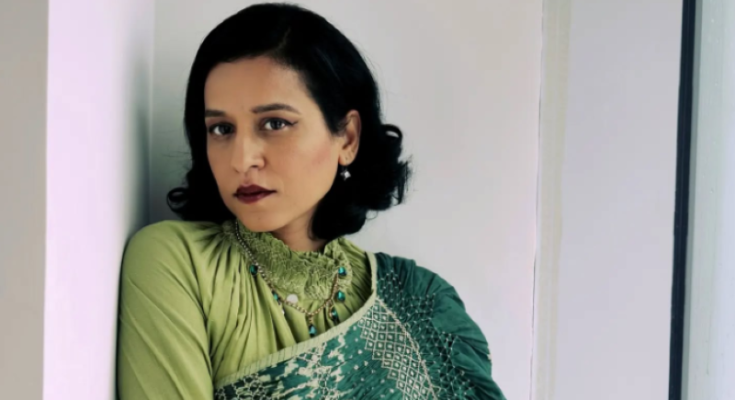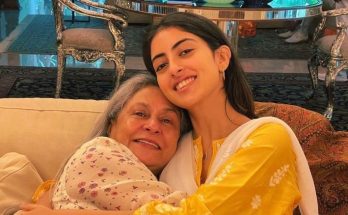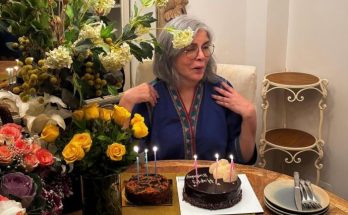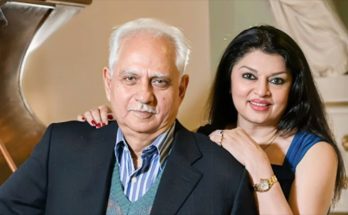#TillotamaShome#TheMirror#PaatalLok
IBNS-CMEDIA: Indian actress Tillotama Shome, who is known for Monsoon Wedding, Sir, The Mirror et al, plays a cop in massively popular web series Paatal Lok Season 2. In an exclusive interview with IBNS correspondent Souvik Ghosh, Tillotama speaks on her journey as an actor, portrayal of middle-aged women on-screen and her soaring fame on OTT… Excerpts…
Q. You did drama therapy with people in US prisons. How did that help you grow your perception towards life?
A. What I learnt the most from my experience at Rikers Island Jail [in New York] is the idea of crime and punishment that makes one wonder what was the appropriate punishment for a crime that was caused not because of lack of any morality but the lack of basics that human beings need for survival. It made me wonder what would be the fitting punishment for a crime which was committed because of the unavailability of basics that are required to survive. It also helped me to observe life up close to see how human behaviour changes in extreme situations. It taught me the defined line between sanity and insanity, right and wrong.
The way we react to the crises which we go through in our lives depends on the support and privileges we have. The support factor allows us to take the higher moral ground and not some innate goodness or badness. So it made me understand that all of it exists in all of us and that became in retrospect a great training for the life of an actor because our endeavour is not to judge a role that we play but understand his/her psyche.
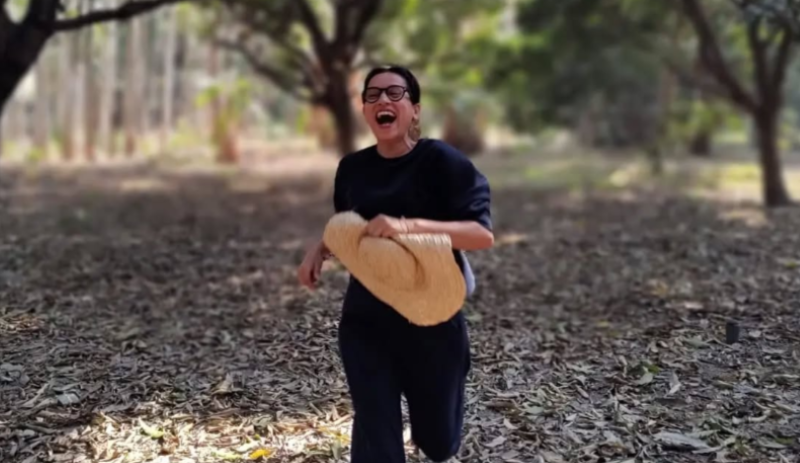 Tillotama Shome | Photo courtesy: Tillotama Shome Instagram handle
Tillotama Shome | Photo courtesy: Tillotama Shome Instagram handle
Q. You struggled to find roles in your 20s and 30s but encountered a very contrasting scenario post 40. How did the struggle period contribute to your growth?
A. None of us can plan because we don’t know what the future holds. We can only talk about these in retrospect. One may sound wiser speaking in retrospect but we question our worth going through those tough phases. One has to become comfortable with the discomfort being employed once in three years. But the films which I did at that time were really powerful and formed the foundation of my career. It was a great opportunity for me to learn about the craft and meet some of the finest directors who shaped my sense of aesthetics and introduced me to the world of books, literature and films that opened my mind. So yes, the phase might be down for having very little work but also had its huge highs of being able to be a life-long learner. Like everyone, my journey in my 20s and 30s was unique. I am grateful for that too. It’s because of that phase I am more comfortable on my skin in my 40s.
Q. There is a huge shift in the kind of roles which are now offered to female actors as compared to the time when you started off your career. How would you describe the transition?
A. The two things that I heard right from when I started acting was that cinema is in peril and the question of the portrayal of women in movies. We have been asking this question forever because inequity exists. We are in a patriarchal society where male-dominated narratives are favoured. That’s the reality of our lives and it has always been difficult to make films, especially the independent ones. There is a sense of fear that it would be even more difficult in the distribution of films if they are based on women. So it has always been tough. With the advent of OTT platforms, the long format was introduced allowing more characters and stories to co-exist and the protagonist is turned to an ensemble which has let more voices come in. The change is really because of the writers, who are from different walks of life, who came into the fray and told stories from different parts of India. Their stories were so unique that they needed a host of actors to interpret those and that’s something I have been vastly benefitted from.
Q. How did Konkona Sen Sharma’s re-imagination of Tillotama Shome in The Mirror help you to view yourself differently?
A. I think it changed the perception of others about me. I didn’t change my perception of myself because Konkona and I are also friends and we see each other for who we are. She (Konkona Sen Sharma) knows me as a person outside of the films that I have done. So her portrayal of me as a city modern woman who lives in Bombay [Mumbai] was age-appropriate as opposed to trying to be younger or older. It was nice to finally play a part that was age-appropriate and cared about the desire of a middle-aged woman.
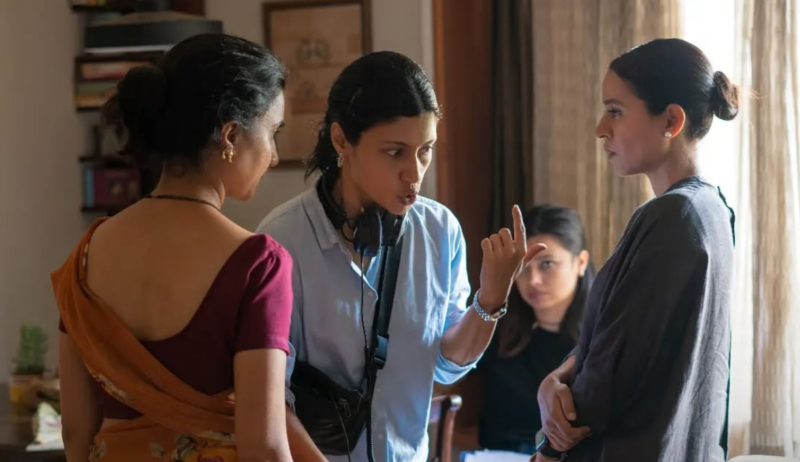 Konkona Sen Sharma [C] directing Tillotama Shome [R] and Amruta Subhash [L] in The Mirror | Photo courtesy: Tillotama Shome Instagram handle
Konkona Sen Sharma [C] directing Tillotama Shome [R] and Amruta Subhash [L] in The Mirror | Photo courtesy: Tillotama Shome Instagram handle
Despite its richness, a very little about the middle-age phase of a woman’s life is explored in films because society as a whole is disinterested in it. But as more women filmmakers in their mid-40s are telling stories that are relevant for them, we are getting opportunities to talk and have protagonists that are of this age like in Payal’s [Payal Kapadia] film All We Imagine as Light or Suchi’s [Suchi Talati] Girls Will Be Girls that has seen as the mother talking so beautifully, poetically, powerfully subverting the idea of female desire and looking at the interiority of a woman collapsing the male gaze. Whatever may be the moral compass or prejudices, if the writing is sensitive to what is happening inside a person’s life then one has a sense of understanding and then judgement becomes difficult because he/she is seen as a human being with all his/her greyness and complexities so it was really powerful to be a part of a story like The Mirror followed by Tribhuvan Mishra [Tribhuvan Mishra CA Topper] where the writers, directors and creators did not hesitate from opening up and really find the inner life of a woman, who is not young or beautiful or rich by conventional standards which are the only things that mainstream seems to be interested in.
Q. How was your exploration of playing a cop in Paatal Lok Season 2? We don’t come across women cops on-screen too often.
A. The world of Paatal Lok Season 1 had already established itself as a clutter-breaking show with really powerful writing of a cop like Hathi Ram [Hathi Ram Chaudhary, protagonist played by Jaideep Ahlawat]. It had already broken many stereotypes of male cops. So in the world of Season 2, the way Sudip [Sudip Sharma] has written the part of Meghna Barua [Tillotama’s role] with just economy that it was immensely powerful to just have read it. I sensed the power in all women characters of the series when I read the script.
Meghna’s one-liners spoke volumes of the prevailing inequity in the world without any big lecture or wailing about how unfair it is in this male-dominated world. The portrayal of Meghna as a busy professional trying to balance her family life with a young son is a mature portrayal of a working mother. There is a huge population of such women in India but we don’t seem to represent them in our stories enough. So it was really heartwarming to do that, be it in The Mirror or Paatal Lok.
Q. Was there any reference point for you to play the role?
A. No, no, I just followed the script, which was so dense with multiple threads eventually culminating to make sense. The power of Sudip’s writing is such that one would find something new with every fresh read. The written instructions and directions were so clear that one could get it in the mind what it could feel like in flesh and blood. So I just had to read it repeatedly and get on set. But since I was unfamiliar with Nagaland, my dialect coach introduced me to an ADSP [Additional Superintendent of Police] whom I observed at her workplace to understand how she cuts through space, carries and conducts herself and gives her orders. It fired up my imagination. It was not about copying or imitating her but I just observed her to get a sense of it. These were the combination of things that helped me build Meghna. It was really all in the writing.
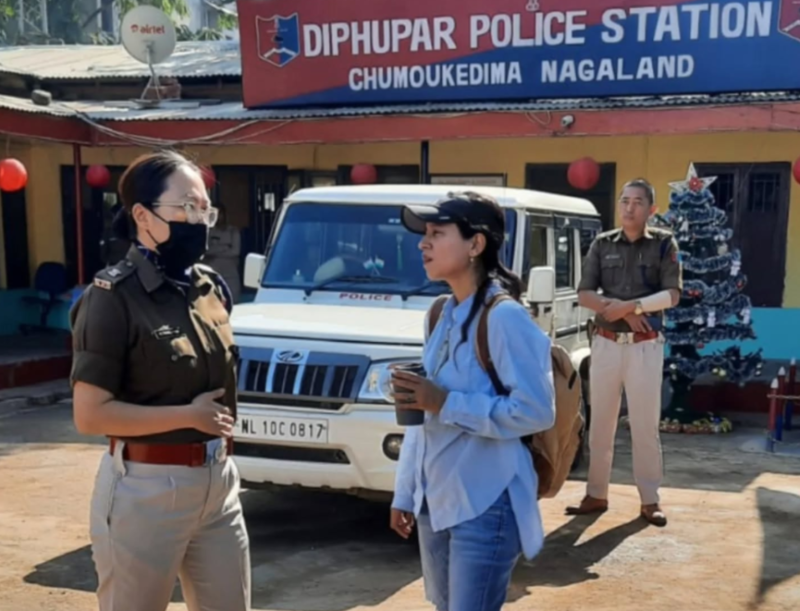 Tillotama Shome [R] with ADSP Tiamnela [R] for Paatal Lok Season 2 | Photo courtesy: Tillotama Shome Instagram handle
Tillotama Shome [R] with ADSP Tiamnela [R] for Paatal Lok Season 2 | Photo courtesy: Tillotama Shome Instagram handle
Q. Your upcoming Bengali film Baksho Bondi or Shadowbox is set for a premiere at Berlin International Film Festival!
A. Yes, I’m really excited about it. I survived the first 20 years of my career doing independent cinema because these very film festivals gave my flicks a home even though they were not watched in my own country. I have never been to Berlin so I am really excited about it. I am equally excited for the world to know that Tanushree Das and Saumyananda Sahi, who are already known as editors and DoPs, are making their feature film debut. They are amazing human beings. I look forward to it very much.
Q. How does it feel now to get recognised by the Indian audience besides getting your films premiered at the festivals?
A. It feels wonderful. But I am also a late bloomer so I came into the OTT much later than my colleagues. The number of people Sir reached after its Netflix release was mind boggling and in that sense, I am only a six-year-old when it comes to OTT platform and having access and reach to so many viewees. So it’s very new even now and I am still taking it all in. It gives me great pleasure and I feel like a part of the community of creatives in India. It’s really nice to be a part of the community and gives me a sense of kinship and makes me feel less lonely. The sheer number of viewers who are watching my works is still mind boggling to me because I am not accustomed to it and it’s something that fills me with a sense of wonder and gratitude. I will not take it for granted.
(Photo courtesy: Tillotama Shome Instagram handle)

